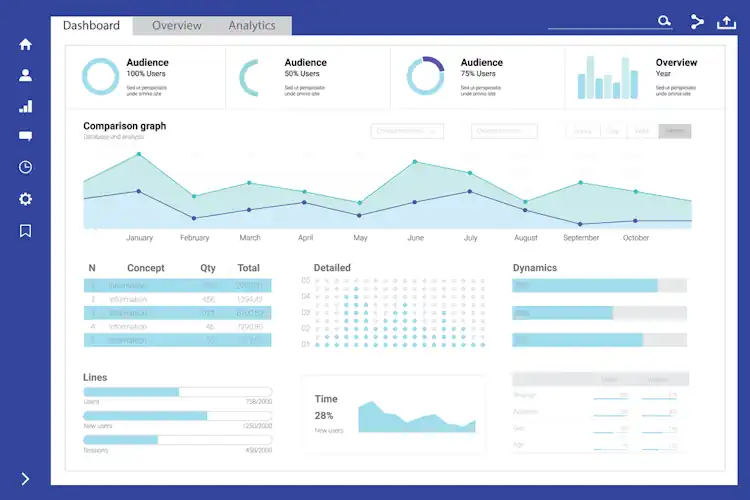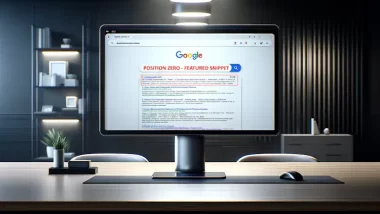In the world of search engine optimization (SEO), the concept of E-E-A-T (Experience, Expertise, Authoritativeness, and Trustworthiness) has gained significant importance. Google’s algorithms increasingly prioritize websites that demonstrate these qualities, as they do their best to provide users with the most relevant, reliable, and valuable content.

Let’s explore how you can enhance your website’s E-E-A-T through effective on-page optimization strategies.
Demonstrating Experience
One of the key components of E-E-A-T is having real-world experience in the topic you’re writing about. Google values content created by individuals or organizations with firsthand experience, as it often leads to more accurate, in-depth, and valuable information. To showcase your experience on your website, consider the following strategies:
- About page and author bios: Create detailed and engaging about pages and author bios that highlight your relevant experience, qualifications, and achievements.
- Detailed Case Studies: Display comprehensive case studies that highlight successful projects or challenges you’ve overcome. These should include context, actions taken, and results achieved, providing concrete evidence of your experience.
- Testimonials and Reviews: Incorporate testimonials and reviews from previous clients or customers. Positive feedback from real people adds credibility and demonstrates your ability to deliver positive outcomes.
- Portfolio of Work: For creative fields or project-based industries, include a portfolio that showcases a range of past work. This visual evidence of your capabilities allows visitors to assess the quality and scope of your experience directly.
- Professional Background: Share detailed bios of team members, emphasizing their years of experience, areas of specialization, and significant accomplishments. This highlights the depth of expertise and experience your team brings to the table.
- Timeline of Achievements: Create a timeline or an “Our Story” page that traces the history of your company, including major milestones, awards, and expansions. This illustrates growth and sustained operation, which can be persuasive indicators of experience.
- Industry Certifications and Accreditations: List any relevant industry certifications or accreditations that you or your company have earned. These qualifications serve as third-party validation of your expertise and experience.
- Educational Content: Produce blogs, tutorials, webinars, and other educational content that share knowledge and insights gained from real-world experience. This not only showcases your expertise but also demonstrates a commitment to contributing value to your industry.
- Media Mentions and Appearances: If you or your company have been featured in media or at notable industry events, include a press section with articles, interviews, and other media appearances. This external recognition can significantly boost your perceived experience and credibility.
By incorporating experience-focused content into your on-page SEO, you can effectively demonstrate your expertise and build trust with your audience.
Establishing Expertise
Expertise is another crucial factor in E-E-A-T and SEO. Google aims to rank content created by experts in their respective fields higher in search results. Showcasing “expertise” on your website is crucial to establishing credibility and attracting clients or customers who are looking for high-quality, professional services. Here are some effective ways to demonstrate expertise on your site:

- In-depth, well-researched content: Create comprehensive, well-researched content that provides valuable insights and information to your readers.
- Proper sourcing and citations: Always cite your sources and link to reputable, authoritative websites to support your claims and demonstrate your commitment to accuracy.
- Author credentials and qualifications: Highlight your authors’ credentials, qualifications, and achievements to establish their expertise in the subject matter.
- Professional Qualifications: List your formal qualifications, special certifications, or licenses that are relevant to your field. This information conveys that you are formally recognized as an expert in your area.
- Thought Leadership: Publish articles, white papers, and blog posts that provide deep insights into your industry. This content should reflect cutting-edge knowledge and a deep understanding of your field, positioning you as a thought leader.
- Educational Content: Offer tutorials, e-books, or courses that help educate your audience on topics within your expertise. This not only showcases your knowledge but also helps to build trust with your audience.
- Speaking Engagements and Panel Discussions: Highlight any speaking engagements or times you have participated in panel discussions at industry conferences. You can include videos or links to these events, which provide tangible proof of your role as an expert in the field.
- Awards and Recognitions: Display any awards or recognitions you or your company have received. Being recognized by peers or industry bodies enhances your credibility and underscores your expert status.
- Client Success Stories: Share detailed success stories or case studies that demonstrate how your expertise has resulted in real-world success for clients. This practical evidence of your ability to apply your knowledge effectively can be very persuasive.
- Testimonials and Endorsements: Include testimonials from respected figures in your industry or satisfied clients. These endorsements can significantly enhance your reputation as an expert.
- Professional Memberships: Mention any professional organizations or societies you are a member of. Membership in reputable organizations reinforces your commitment to your profession and your expertise.
- Media Appearances: If you’ve been featured in the media as an expert commentator, include these clips or mentions on your site. Media appearances are a strong indicator of your authority and expertise.
- Portfolio of Work: For professions that produce tangible outputs like design, architecture, or software development, a portfolio showcasing your best work can vividly demonstrate your technical skill and knowledge.
You might also consider using expert quotes and collaborations to further enhance your website’s perceived expertise. By combining several of these elements, you can effectively convey your expertise to visitors on your website, making it clear why you are a leader in your field.
Overlap in Expertise and Experience
There’s a significant overlap between showcasing experience and expertise, as both elements complement each other and contribute to building your credibility and authority in your field. Here’s how some elements can serve both purposes:

- Case Studies and Portfolio: These demonstrate not just the breadth of your experience, but also the depth of your expertise through the complexity and success of the projects you’ve undertaken.
- Testimonials and Reviews: While they reflect past client satisfaction and experience, they also underscore your expertise by highlighting your ability to meet or exceed expectations in your specialty.
- Professional Qualifications and Certifications: These credentials are proof of both your commitment to your field (experience) and your specific skills and knowledge (expertise).
- Educational Content: By teaching others through blogs, tutorials, and webinars, you not only show that you’ve been around the block (experience) but also that you know your subject well enough to educate others (expertise).
- Speaking Engagements and Media Appearances: Being selected to speak at industry events or being featured as an expert in media showcases both your role as an experienced professional and an authoritative expert.
- Awards and Recognitions: Achievements can illustrate long-term involvement and success in the industry (experience) as well as recognition of your advanced skills and knowledge (expertise).
Using these elements strategically on your website will help you effectively communicate both your experience and your expertise, reinforcing your reputation as a trustworthy and capable professional in your domain.
Building Authoritativeness
Authoritativeness is closely related to expertise but focuses more on the overall reputation and influence of your website within your industry. Showing “authority” on your website is about demonstrating that you are a leading voice and a go-to resource in your field. This can significantly influence how clients, customers, and peers perceive your professional standing. To build authoritativeness through on-page optimization, consider the following strategies:

- Endorsements from Industry Leaders: If prominent figures in your industry endorse your work or collaborate with you, highlight this on your site. Such endorsements can significantly boost your authority.
- Media Features: Include any articles, interviews, or features from reputable media outlets where you or your company are cited as experts. Display logos of these outlets to visually reinforce the recognition.
- Linking to and from high-authority sources: Link to reputable, high-authority websites within your content, and work to earn backlinks from these sources to your own site.
- Consistent, accurate, and up-to-date information: Ensure that your content is consistently accurate, up-to-date, and in line with current industry standards and best practices.
- Engaging with your audience: Actively engage with your audience by responding to comments, questions, and concerns in a helpful and professional manner.
- Endorsements from Industry Leaders: If prominent figures in your industry endorse your work or collaborate with you, highlight this on your site. Such endorsements can significantly boost your authority.
- Industry Awards and Accolades: Highlight any awards or accolades you or your organization have received. Awards from reputable organizations within your industry can significantly bolster your authority.
- High-Profile Clientele: If you’ve worked with well-known clients or brands, mention these collaborations prominently. Having a portfolio that includes respected names suggests you are trusted by industry leaders.
- Leadership Positions: Mention any leadership roles you hold or have held in industry associations or professional groups. Leadership roles indicate you are recognized by your peers as an authority.
- Press Coverage: Include any positive media coverage, articles, interviews, or features from reputable sources. Media recognition serves as a third-party endorsement of your authority.
- Speaking Engagements: Highlight your participation as a speaker or panelist at significant industry events. Being invited to speak on expert panels or at conferences is a strong indicator of your authority.
- Publications: If you’ve authored or contributed to well-regarded publications, including books, industry journals, or major websites, list these. Authorship is a powerful way to establish authority.
- Endorsements and Partnerships: Display endorsements from other respected figures or brands in your field. Also, showcase any partnerships with industry leaders or reputable organizations.
- Professional Certifications and Memberships: Show any advanced certifications or exclusive memberships to prestigious organizations. These can underline your accepted status as an expert.
- Educational Initiatives: If you offer courses, lectures, or seminars, especially if they’re accredited by professional bodies, it underscores your authority and your role as an educator within your field.
- Testimonials and Case Studies: Feature testimonials that specifically address your influence and leadership, and detailed case studies that showcase your role in guiding significant projects or decisions.
By integrating these elements into your website, you can effectively communicate your authority to both visitors and search engines, helping to establish a strong and trustworthy presence in your industry. Remember that off-page factors, such as backlinks and social media presence, also play a significant role in building authoritativeness.
Conveying Trustworthiness
Trustworthiness is essential for both E-E-A-T and SEO, as Google aims to promote websites that users can trust to provide reliable, safe, and honest information. To convey trustworthiness on your website effectively, it’s important to provide clear, honest communication and evidence that others trust you. Here are several strategies to demonstrate trustworthiness: To convey trustworthiness through on-page elements, focus on the following:

- Privacy policies and security measures: Clearly display your privacy policies and any security measures you have in place to protect user data.
- Transparency and honesty in content: Be transparent and honest in your content, disclosing any affiliations, sponsored content, or potential biases.
- Transparent Contact Information: Make it easy for visitors to contact you. Include a phone number, email, and physical address if applicable. This transparency helps build trust by showing that you are accessible and accountable.
- Privacy Policy and Security Certifications: Clearly state your privacy policy and include any relevant security certifications (like SSL certificates or compliance badges such as PCI-DSS for payment processing). This reassures visitors that their data is safe with you.
- Clear, Professional Website Design: A well-designed, professional-looking website suggests that you invest in your business and care about your audience’s experience. Poor design or a cluttered layout can raise doubts about your reliability.
- Customer Testimonials and Reviews: Share positive feedback from previous customers or clients. Real testimonials are powerful in building trust as they show that others have had good experiences with your services or products.
- Detailed About Us Page: Provide a thorough and honest background about your company and team. This builds a personal connection and helps visitors feel more comfortable doing business with you.
- Case Studies with Measurable Results: Showcase detailed case studies that highlight your problem-solving skills and the results you’ve achieved for other clients. This not only demonstrates competence but also reliability and effectiveness.
- Awards and Endorsements: Display any industry awards, recognitions, or endorsements from reputable organizations. These accolades are a testament to your standing and reliability in your field.
- Updated Blog or Resource Section: Regularly updated content that provides valuable information reflects your commitment to your field and to serving your customers’ needs.
- Money-Back Guarantees or Warranties: Offering guarantees or warranties can alleviate concerns about the risk of purchasing and show confidence in your products or services.
- Professional Affiliations: Mention memberships in professional organizations, which can enhance credibility as these groups often require certain ethical standards or qualifications.
- Social Proof and Media Mentions: If you’ve been mentioned in the media or have a social media presence with positive interactions, showcase these on your site. They serve as social proof that you are active and respected in your community.
By employing these strategies, you can effectively communicate trustworthiness on your website, encouraging visitors to feel more secure in engaging with your business.
Consistent branding and messaging across your website can also help build trust with your audience.
So How Does E-E-A-T Help with SEO?
E-E-A-T plays a crucial role in Search Engine Optimization (SEO) as these factors significantly influence how search engines, especially Google, assess and rank content. Here’s how each element of E-E-A-T helps with SEO:

Expertise:
-
- Content Quality: Search engines prioritize content that shows a high level of expertise because it tends to be more informative, accurate, and useful to users. Demonstrating deep knowledge of your content can lead to better rankings.
- Keyword Usage: Expert content naturally incorporates relevant keywords in a meaningful context, which helps search engines understand and correctly categorize the content.
Experience:
-
- Content Depth and Breadth: Experience can be reflected in the content’s depth, covering topics comprehensively. This can lead to better user engagement and satisfaction, which search engines favor.
- User Experience: Experienced webmasters are likely to offer a better overall user experience, including faster load times and mobile optimization, which are important for SEO.
Authoritativeness:
-
- Link Building: Authoritative sites often receive more inbound links from other credible sites. Search engines use these links as a major ranking signal, interpreting them as endorsements of content quality.
- Brand Recognition: As your site becomes recognized as an authority, it may get more mentions across the web, even without direct links. This broader recognition can also positively impact rankings.
Trustworthiness:
-
- User Engagement: Trustworthy sites usually provide a secure, user-friendly experience, which encourages longer visits and lower bounce rates—factors that search engines consider when ranking sites.
- Technical Security: Implementing HTTPS and showing clear privacy policies and secure payment gateways (if applicable) help in ranking higher since search engines prefer sites that are secure and protect user privacy.
Google’s Emphasis on E-E-A-T
Google has explicitly stated the importance of E-E-A-T in its Search Quality Evaluator Guidelines, which are used to help human raters assess the quality of search results. Although these guidelines do not directly influence the algorithm, they reflect what Google seeks to achieve with its algorithm updates. Websites that align well with E-E-A-T principles are likely to perform better in search results because they are seen as delivering more value to users.
SEO Strategy Integration
Integrating EEAT into an SEO strategy involves focusing on producing high-quality content, ensuring the website is secure and user-friendly, building a reputation through external links and social proofs, and regularly updating the website to reflect the latest information and technologies. Doing so not only aligns with search engine ranking factors but also improves the overall user experience, leading to higher engagement, more conversions, and increased loyalty among visitors.
What if You Are Just Starting Out?
Starting as a new blogger and establishing experience, expertise, authoritativeness, and trustworthiness without a long track record can be challenging, but there are effective ways to build and demonstrate these qualities early on:

- Focus on Quality Content: Even if you’re new, you can show expertise and start building authority by creating high-quality, well-researched content. Cover topics in depth, use reliable sources, and provide unique insights that aren’t readily available elsewhere.
- Leverage Your Background: Use any relevant experience or education you have to bolster your credibility. Even if it’s not direct experience in your topic, any professional or academic background can lend credibility to your expertise in your blog’s subject matter.
- Professional Website Design: A clean, professional design can make a significant first impression and build trust. Ensure your site is easy to navigate, has a consistent theme, and loads efficiently.
- Be Transparent: Share your journey and mission with your readers. Being honest about being new and your goals for the blog can create a personal connection and build trust.
- Guest Posting: Write guest posts for established blogs in your niche. This can help you tap into existing audiences and borrow some of the host blog’s credibility.
- Network with Other Bloggers: Building relationships with other bloggers can lead to mentions, backlinks, and collaborations. These can serve as endorsements and boost your perceived authority.
- Engage with Your Audience: Respond to comments on your blog and interact with your readers on social media. Being responsive and engaging helps build a community and trust.
- Regular Updates: Consistently posting new content keeps your blog fresh and shows commitment, which can encourage trust and establish your authority over time.
- Cite Sources: When discussing factual information, always cite credible sources. This not only supports the accuracy of your content but also shows that you value reliability and truthfulness.
- Start Building a Portfolio: Even small projects or interactions can be compiled into a portfolio of work. Document your progress, the challenges you’ve faced, and the solutions you’ve found.
- Ask for Feedback: Encourage and publicly respond to feedback. Showing that you value and act on feedback can quickly elevate your trustworthiness.
- Display Any Credentials: If you have any certifications, even from simple online courses related to your blogging topic, display them. They can immediately lend more weight to your expertise.
By focusing on these areas, you can begin to build a solid foundation for E-E-A-T and gradually establish yourself as a trusted voice in your niche.
Measuring and Monitoring E-E-A-T
To effectively enhance your website’s E-E-A-T, you’ll want to regularly measure and monitor your progress. Use tools and metrics such as Google Analytics, Search Console, and SEO auditing software to assess your website’s performance and identify areas for improvement.
Regularly audit your on-page E-E-A-T factors and make necessary updates and optimizations. Stay informed about Google’s guidelines and algorithm changes to ensure that your strategies align with current best practices.

Summing Up
Enhancing your website’s E-E-A-T through on-page optimization is crucial for success in modern SEO. By demonstrating experience, establishing expertise, building authoritativeness, and conveying trustworthiness, you can improve your search engine rankings and provide a better experience for your users.
Remember that E-E-A-T optimization is an ongoing process that requires continuous effort and improvement. By staying committed to providing high-quality, reliable, and valuable content, you can build a strong foundation for long-term SEO success.

